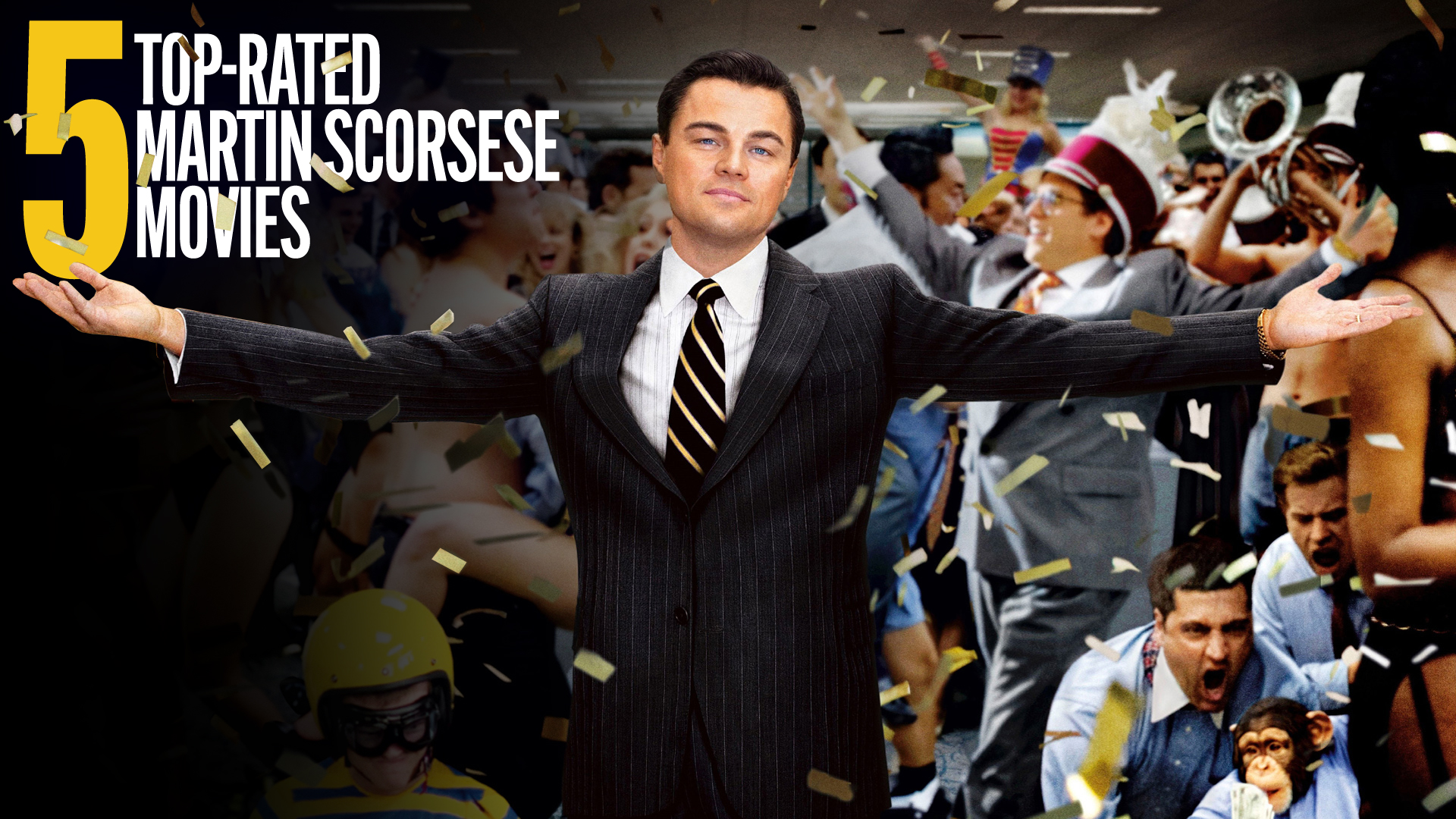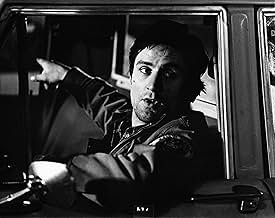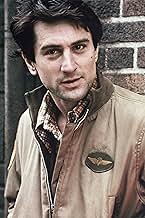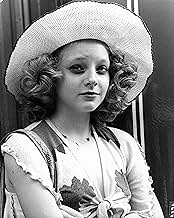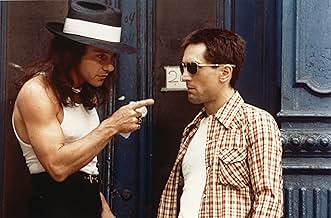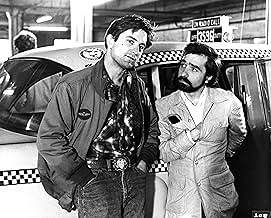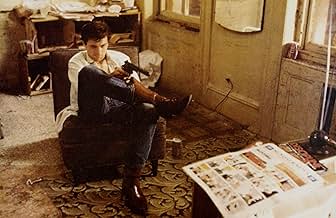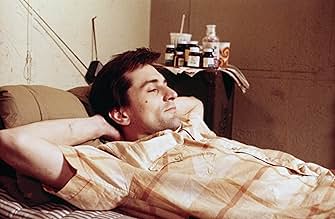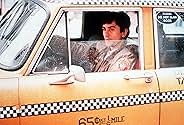Un veterano mentalmente instabile lavora come tassista notturno a New York, dove la percezione della decadenza e dello squilibrio alimenta la sua voglia di violenza nel suo tentativo di libe... Leggi tuttoUn veterano mentalmente instabile lavora come tassista notturno a New York, dove la percezione della decadenza e dello squilibrio alimenta la sua voglia di violenza nel suo tentativo di liberare un lavoratore della campagna presidenziale e una prostituta minorenne.Un veterano mentalmente instabile lavora come tassista notturno a New York, dove la percezione della decadenza e dello squilibrio alimenta la sua voglia di violenza nel suo tentativo di liberare un lavoratore della campagna presidenziale e una prostituta minorenne.
- Candidato a 4 Oscar
- 22 vittorie e 21 candidature totali
- Concession Girl
- (as Diahnne Abbot)
- Melio
- (as Vic Argo)
Recensioni in evidenza
Scorsese and Schrader went on to make other great movies after this, both separately ('The King Of Comedy', 'Light Sleeper') and together ('Raging Bull', 'The Last Temptation Of Christ'), but this is easily the best movie of their careers. And Robert De Niro's too. He has yet to top his stunning performance here as the deeply disturbed and alienated Vietnam veteran Travis Bickle, cabbie and would be assassin. This character has not surprisingly entered movie legend.
Scorsese surrounds De Niro with a first rate supporting cast, including small but effective roles from Harvey Keitel ('Reservoir Dogs'), Peter Boyle ('Hardcore'), the underrated Victor Argo ('The King Of New York') and Joe Spinell ('Maniac'). Albert Brooks and Jodie Foster are also very good, and even Cybil Shepherd, the butt of many jokes, is fine as Bickle's obsession.
When you combine these actors, Schrader's outstanding script, and Scorsese's brilliant direction, with the stunning cinematography (Michael Chapman) and haunting score (Hitchcock fave Bernard Herrmann's final effort), you have yourself a truly unforgettable cinematic experience. If you haven't seen 'Taxi Driver' I urge you to do so immediately. It is a masterpiece, pure and simple.
**** (out of 4)
Scorsese's masterpiece is a raw, powerful and nerve wrecking look at depression and loneliness. The film centers on taxi driver Travis Bickle (Robert De Niro), a man clearly with his own demons who finds a purpose in life when he meets a 12-year-old hooker (Jodie Foster) who he plans on saving from her pimp (Harvey Keitel). To me this is one of the richest films ever made and it's one that can easily be overlooked in some circles if you don't really connect to what the film is trying to say. I didn't care too much for the movie the first few times I watched it because I was too young to really understand depression and loneliness. After I understood what those things could do to a person is when I fully became aware of the power in this film and today it remains one of the most powerful films ever made. To me the entire film is pretty much about Travis trying to find someone to fit in with but of course it never really happens until he meets the hooker. He tries fitting in with the Cybill Shepherd character but falls flat on his face. He tries fitting in with his co-workers but that doesn't work out too well. No matter what Travis tries he keeps ending up alone and as he put it, he's God's lonely man. This film works on so many levels but I think the psychological one is where it's best at. Getting us into the mind of Travis works for many reasons but the biggest keys are the direction by Scorsese, the brilliant music score by Bernard Herrmann and DeNiro's groundbreaking performance. Putting those three things together is what makes this a classic but we can also throw in the screenplay by Paul Schrader, which rightfully gives the movie the time and patience to let the Travis character grow right in front of our eyes. DeNiro's performance is certainly one for the ages, although I think he would get even better with Scorsese's RAGING BULL, which would follow in four years. His performance here is nothing short of amazing because you can't help but be terrified by this guy because of the look in DeNiro's eyes. You can't help but feel sorry for him at the same time because there are countless moments where he embarrasses himself because he simply doesn't know how to fit in. The word anti-hero gets used a lot and perhaps that's a good term but I think it's something much deeper than that. DeNiro hits all the right marks without a false note anywhere. Foster is also impressive in her few scenes in the film as is Keitel as the pimp. Shepherd is also good as his Albert Brookes and the underrated Peter Boyle who has one of the best scenes in the movie where he's trying to talk some sense into Travis. The visual look of the film is mighty impressive and Scorsese's directing style is nothing short of amazing. The slimy looking streets and the dark atmosphere are one of a kind and something many films tried to copy but could never get it as perfect as it is here. This here remains one of the greatest American films ever made and I'm really not sure any movie could top it in showing the effects that loneliness can have on a person.
This film is about loneliness, about the isolation of a man in a society full of scum. His objective is to finish with the scum of the streets. The story uses a taxi driver as a metaphor of loneliness and it has some kind of irony because we can see that a city which is full of people can be the most lonely place for a man. The long nights in the city, the night environment full of whores, junkies, pimps and thieves are the main elements of the world in which Travis Bickle lives. Travis is an misunderstood guy who is seeking desperately for some kind of company because as he says 'loneliness has followed me all my life, everywhere' but at the same time he seems not to do anything to avoid his situation and it is seen when he goes with Betsy (Cybill Shepherd) to a porn cinema. At the end of the film the character makes real his most violent fantasies, with a look of certain soldiers from Vietnam, and he behaves like this because of his loneliness, his alienation and because he does not find any sense to his life. The violent behaviour becomes Travis into a hero, although he had killed many people and he could do it again. Although he acts with an extreme violence the spectator understand him and the reasons why he acts that way. The soundtrack of the film, which is composed by Bernard Herrmann, inspires some kind of loneliness and sometimes it is absolutely terrifying like in a horror film. This music and the slow camera showing the streets help to introduce the spectator into the world of Travis, to know what he is thinking about.
In general I cannot say any negative aspect of this film because I have not found anything bad. Although it is a film of the 70s it is not an old-fashioned movie because the essence of the story, the reality that is shown on it, can be perfectly referred to the current society. This film has the privilege of having made famous the sentence You talking' to me? You talking' to me?' which will remain in the history of cinema. This is an authentic masterpiece.
Hardly the most uplifting of films it is engaging and impressive and truly deserves the reputation it has. Martin Scorsese and Paul Schrader have produced a film that convincingly portrays a man cut out of society who has the slightest connection to normality before finding it eroded away. The script is brilliant because the detail is engaging but it is this descent into a very modern type of madness that drives the film forward. Travis has just enough about him that is recognisable that it makes it so easy to go along with the rest of his madness. A major part of this is getting the feeling right about living in a cesspit; a city that seems to have forgotten its way morally New York is the strongest example but elements of it could be parts of any city I suspect. In painting this world in such a real way, Scorsese has made Travis all the more convincing and, to a point, all the easier to follow in his fall. Like I said it is not a film to morally uplift you but one that is depressingly fair. There is no redemption in this modern world and although it appears that the violence at the end somehow redeems Travis in reality by showing "society" accepting his action it drags the rest of us down nearer the world that he hates and has become part of. I love King of Comedy for the same reason albeit in a different world.
Scorsese injects a real understanding of the place and a real sense of foreboding into even the earliest scenes. He inserts clever and meaningful shots into scenes that other directors might just have filmed straight and his choice of scene and shot compliments the script is depicting Travis descending into madness. What makes the film even better is De Niro showing the type of form that makes his recent form such a major disappointment. He is outstanding as he moves Travis from being relatively normal to being eaten up from the inside out. His eventual implosion is impressive but it is only as impressive as the gradual slide he depicts over the course of the film. Although he dominates it, others impress as well. Foster stands out in a small role, while Keitel makes a good impression as the pimp. Shepherd is not quite as good but her character was not as well written as the others so it isn't all down to her. Regardless, the film belongs to De Niro and although the quotable scenes are the ones that are remembered it is in the quieter moments where he excels and shows genuine talent and understanding.
Overall an impressive and morally depressing film that deserves its place in cinematic history. The portrayal of a city and a man slipping into moral insanity is convincing and engaging and it shows how well to "do" modern madness and the effects of the moral void of parts of society. Scorsese directs as a master despite this being at an early stage in his career and De Niro is chillingly effective as he simply dominates the film in quiet moments and quotable moments alike. I rarely use phrases like "modern classic" because I think they are lazy but this is one film that certainly deserves such a label.
What Scorsese Film Ranks Highest on IMDb?
What Scorsese Film Ranks Highest on IMDb?
Lo sapevi?
- QuizRobert De Niro has said that despite having won an Oscar for Il padrino - Parte II (1974), he was still a relatively unfamiliar face, and was only recognized once while driving a New York cab during his research for this film.
- BlooperIn an earlier version, Iris's timekeeper discovers a weapon on Travis, disarms him, then returns it to him as he's leaving. The scene was edited out, but the gun is still in the timekeeper's hand when he looks at his watch.
- Citazioni
Travis Bickle: Listen, you fuckers, you screwheads. Here is a man who would not take it anymore. A man who stood up against the scum, the cunts, the dogs, the filth, the shit. Here is a man who stood up! Here is...
- Curiosità sui creditiThe original television version of the film featured the following disclaimer before the closing credits: "To our Television Audience: In the aftermath of violence, the distinction between hero and villain is sometimes a matter of interpretation or misinterpretation of facts. 'Taxi Driver' suggests that tragic errors can be made.- The Filmmakers."
- Versioni alternativeOriginal UK cinema and video versions suffered a very brief 1 second sound cut to the scene where Iris unzips Travis's fly in the bedroom. The BBFC finally restored this cut in 1993.
- ConnessioniEdited into Aristokraticheskiy kinematograf: Episodio #1.1 (2011)
I più visti
Dettagli
- Data di uscita
- Paese di origine
- Sito ufficiale
- Lingue
- Celebre anche come
- Taksista
- Luoghi delle riprese
- 87 Columbia Heights, Brooklyn, New York, Stati Uniti(Travis is buying guns at an apartment in Brooklyn Heights)
- Aziende produttrici
- Vedi altri crediti dell’azienda su IMDbPro
Botteghino
- Budget
- 1.300.000 USD (previsto)
- Lordo Stati Uniti e Canada
- 28.262.574 USD
- Fine settimana di apertura Stati Uniti e Canada
- 116.458 USD
- 19 feb 1996
- Lordo in tutto il mondo
- 28.737.520 USD





